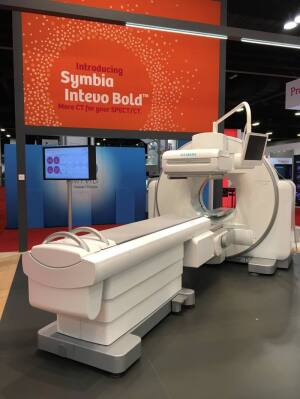por
John W. Mitchell, Senior Correspondent | June 12, 2017
At SNMMI 2017 in Denver, Siemens Healthineers offered a new array of nuclear imaging products designed to bring flexibility to health care providers pacing their adoption of new technology at a rate their individual budgets allow.
The company is also seeking to leverage its reputation for technology investments in SPECT/CT, PET/CT and molecular imaging software with the demands of outcome measurements and bundled payments.
The Symbia Intevo Bold SPECT/CT offers customers an option for expanding into dual-use capability. According to Collin Schaffer, Global Product Marketing Manager with Siemens Healthineers, while the system was just FDA-cleared in January, it’s officially being rolled out at SNMMI 2017.



Ad Statistics
Times Displayed: 68650
Times Visited: 2236 Ampronix, a Top Master Distributor for Sony Medical, provides Sales, Service & Exchanges for Sony Surgical Displays, Printers, & More. Rely on Us for Expert Support Tailored to Your Needs. Email info@ampronix.com or Call 949-273-8000 for Premier Pricing.
“But we've been talking to hospitals and clinics about it, and we've already had five installs worldwide,” Schaffer told HCB News.
The reason for the early demand is that the Symbia Intevo Bold system is designed for the growing practice of CT and SPECT dual-use. This is especially true for sites that are seeking backup CT capability, but also want the option for performing both SPECT and CT on patients in the same scheduled exam.
The system also – for the first time – offers the SAFIRE (Sinogram Affirmed Iterative Reconstruction) algorithm, which Siemens said can reduce patient radiation exposure by up to 60 percent.
“Symbia Intevo Bold advances the dual-use capabilities of SPECT/CT, enabling exceptional image quality in both forms of imaging at the lowest possible dose,” said Jim Williams, head of Siemens Healthineers Molecular Imaging.
According to Schaffer, the unit also features iMAR (iterative Metal Artifact Reduction) to handle the growing population of patients with dental and orthopedic implants. Any image of such patients is at risk of artifacts that lead to difficult interpretation of exams, which can increase costs, and inconvenience the patient.
“From 2016 to 2026 the number of orthopedic hip and knee joint replacement procedures is projected to double in the United States. So this is a system that enables hospitals and clinics to to address even the most challenging exams with the best image quality at the lowest possible dose,” Schaffer told HCB News.
Siemens also announced at SNMMI that the FDA has cleared its Biograph Horizon Flow edition PET/CT system. The system allows continuous bed motion scanning to enable personalized PET scans based on a patient’s anatomy. The unit is designed for radiation therapy treatment planning, and to capture respiratory gating images up to five times faster than previous unit designs.

